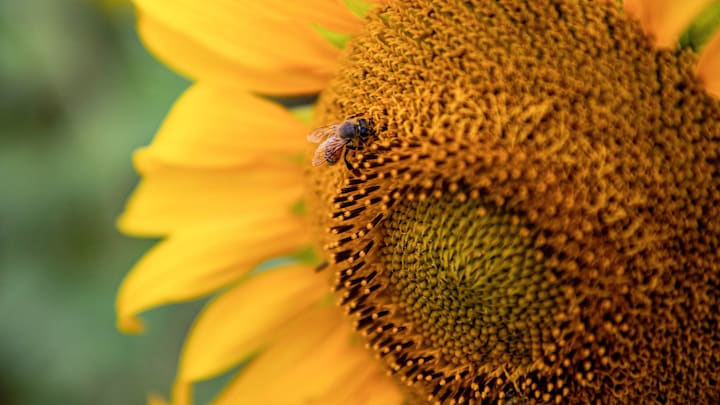The Role of Pollinators in Sustaining Ecosystems

Pollinators, including bees, butterflies, birds, bats, and other animals, play a critical role in sustaining ecosystems and supporting biodiversity. They are essential for the reproduction of many flowering plants, contributing to the production of fruits, vegetables, nuts, and seeds. Pollinators also support the health and stability of ecosystems by facilitating plant reproduction and maintaining genetic diversity. Understanding the role of pollinators and the threats they face is crucial for ensuring ecosystem sustainability and human well-being.
Pollination is the transfer of pollen from the male parts of a flower to the female parts, enabling fertilization and the production of seeds and fruits. While some plants are wind or water-pollinated, the majority of flowering plants rely on animals for pollination. Bees are the most well-known and effective pollinators, but many other insects, birds, and mammals also contribute to this vital process. The relationship between pollinators and plants is often mutually beneficial, with pollinators receiving food in the form of nectar or pollen and plants achieving successful reproduction.
In ecosystems, pollinators are essential for the survival and reproduction of many plant species. They contribute to the genetic diversity of plant populations by facilitating cross-pollination, which involves the transfer of pollen between different individuals of the same species. This genetic diversity enhances the resilience of plant populations to environmental changes, diseases, and pests. Pollinators also support the structure and function of ecosystems by enabling the growth and reproduction of plants that provide habitat, food, and shelter for other organisms.
The ecological importance of pollinators extends beyond their direct interactions with plants. Many animals rely on pollinated plants for food, including herbivores that consume leaves, fruits, and seeds, as well as predators and decomposers that depend on herbivores. Pollinators indirectly support these trophic interactions and contribute to the overall productivity and stability of ecosystems. The decline of pollinators can therefore have cascading effects on plant and animal communities, disrupting ecosystem function and reducing biodiversity.
Human societies benefit from pollinators in numerous ways, particularly through their contributions to agriculture and food production. Over 75% of the world's leading food crops depend on animal pollination to some extent. This includes many fruits and vegetables, such as apples, strawberries, tomatoes, and cucumbers, as well as nuts, seeds, and oil-producing plants. Pollinators enhance crop yields, improve the quality of produce, and contribute to food diversity and nutrition. The economic value of pollination services is estimated to be in the billions of dollars annually, underscoring the importance of pollinators for global food security.
Despite their importance, pollinators are facing significant threats from human activities and environmental pressures. Habitat loss, pesticide use, climate change, disease, and invasive species are contributing to declines in pollinator populations worldwide. The conversion of natural habitats to agriculture, urban development, and infrastructure projects reduces the availability of food and nesting sites for pollinators. Pesticides, particularly neonicotinoids, can harm pollinators directly or indirectly by contaminating their food sources. Climate change affects the distribution and behavior of pollinators and the plants they pollinate, potentially disrupting their interactions.
Efforts to protect and promote pollinators are essential for ensuring their continued contribution to ecosystems and agriculture. This involves creating and conserving pollinator-friendly habitats, reducing pesticide use, and promoting sustainable agricultural practices. Planting diverse, native, and flowering plants can provide food and shelter for pollinators, while protecting natural habitats and restoring degraded areas enhances their survival. Integrated pest management (IPM) approaches, which minimize the use of harmful chemicals and promote biological control methods, can reduce the impact of pesticides on pollinators.
Engaging farmers, landowners, and communities in pollinator conservation is crucial for the success of these efforts. Education and outreach programs can raise awareness about the importance of pollinators and encourage practices that support their health. Policies and regulations at local, national, and international levels play a critical role in protecting pollinators and promoting sustainable practices. The development and implementation of pollinator protection plans can guide conservation efforts and ensure coordinated action.
In conclusion, pollinators are vital for sustaining ecosystems, supporting biodiversity, and contributing to human well-being. Their role in plant reproduction enhances genetic diversity, ecosystem function, and agricultural productivity. However, pollinators are under threat from various human activities and environmental pressures. Protecting and promoting pollinators requires a comprehensive approach that includes habitat conservation, sustainable agricultural practices, and community engagement. By recognizing the importance of pollinators and taking action to protect them, we can ensure the sustainability of our ecosystems and the health of our natural environments.